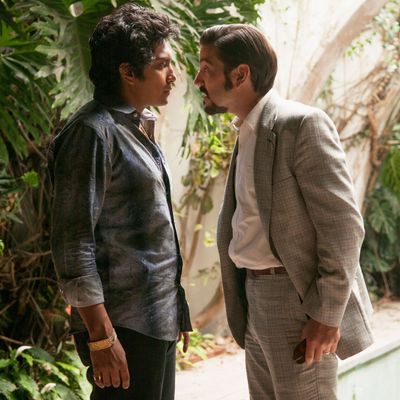
If “Jefe de los Jefes” had solely been about Don Neto, I would have given it five stars. But it’s not, and so I won’t.
It’s not that this is an inherently bad episode — it’s strangely reminiscent of Mad Men in the way some scenes play like dreams rather than with the drugs ’n guns tone Narcos generally sets — it’s just that, seven episodes in, there’s not enough set dressing to mask the fact that the show has been concentrating so hard on moving the plot along that any sense of emotional investment has fallen by the wayside. (Part of this has to do with the fact that these are historical events — you can root for whoever you want but knowing how it’s all going to pan out takes a lot of the air out of the balloon.)
Don Neto’s story line, on the other hand, is rooted not in that game of cat and mouse, but squarely in his personal affairs. Sure, we get glimpses of Kiki and Gallardo’s respective home lives, but they’re auxiliary, particularly in Gallardo’s case. In fairness, it’s mostly been that way for Don Neto, too, as he’s never mentioned having a son before, but Neto has been established to have more in the way of character traits than Gallardo and Kiki, who are primarily defined by their respective trades.
It helps that Joaquín Cosío is giving a particularly impressive performance. It doesn’t matter that we’re just now learning about Don Neto’s family — the way his expression changes when he’s confronted with his son’s dead body immediately packs a punch, as does the moment when he tells Gallardo that his son had wanted to be a lawyer ever since he was a little boy, so as to better protect his father.
The episode’s high point is Don Neto’s visit to Omar, the man responsible for his son Gilberto’s death. (After getting into a brawl at a bar, Gilberto was shot by Omar, who had meant to take down Gilberto’s assailant.) A marvelous thread of tension and anguish runs through the scene, as Don Neto calmly places his gun on the table between them and relates the story of Jesús Malverde, a sort of Robin Hood figure, whom he explains he’d worshipped as a child because he seemed like a kindred spirit. “Even in sin, you can still be a saint,” he says, forgiving Omar for Gilberto’s death as he takes his leave.
As he gets into his car, he tells Sammy that it’s what his son would have wanted. But he can’t allow his son’s murderer to live. So he hands Sammy his gun, and tells him to take care of it.
Though the rest of the episode makes strides when it comes to covering narrative ground (joy of joys, Nava’s number is finally up), it’s simply not as interesting as the sidebar with Don Neto, for lack of a sufficient personal hook.
Rafa in particular is starting to feel like dead weight, as he’s still mooning over Sofia and struggling with both his cocaine addiction and the itchy feeling that he’s becoming irrelevant. It’s become his MO to the point that I almost can’t remember what he was like before. If it represented a significant 180, maybe it’d work, but now-Rafa isn’t much of a departure from then-Rafa, and his murder of two American tourists (as his coke-addled brain takes them to be cops) is just the last straw.
I don’t know how much I’m supposed to care about Gallardo at this point, either, as his head is so in the game that he basically starts talking shop right after offering Don Neto his condolences, physically restrains his wife when she tries to leave him, continues to ignore his promise to Isabella (whom he also grabs when she threatens to tell the others what happened to Falcón after he crows that he took care of the problem himself), and generally acts in a way that makes it clear he thinks he can go it alone. He even straight-out tells his wife, after deciding to ignore her plea for him to return with her to Sinaloa, “I don’t need you anymore.” Oof.
That obsession with the job is echoed in Kiki’s thread of the story, as he decides he can’t leave for San Diego (where Mika is already house-hunting) before Gallardo knows his name. It’s driving him batty to the point that he actually tries to accost Gallardo on the street, yelling his name — and leaving his son alone at a table — as Gallardo gets into his car and drives away. He has a little more luck wheedling Fredo, the pilot, into taking him for a ride so he can get pictures of Rafa’s weed farm. The shots he gets reveal over 1,000 acres of weed, i.e., way too much for even the DEA’s superiors to ignore. (Besides, Kuykendall helpfully threatens to leak the information if they don’t act.)
However, the bust will probably happen in a couple of weeks, and Kiki’s scheduled to fly back to the States in days. So he stays — and comes one step closer to the tragic end of the story.
Seeds and Stems
• The pleasure of seeing Nava knocked off was slightly dulled by how, well, dull I generally found this episode, but still, thank God that asshole is gone.
• The specific scene that made me think this episode was going into Mad Men territory was that of Gallardo, in the throes of a drug-empire existential crisis, sitting stewing in a chair, only to be interrupted by a bird killing itself by flying into a nearby window. He stares at the twitching corpse for a while, before finally calling a meeting to restructure the whole organization (and earn himself a few enemies in the process).

